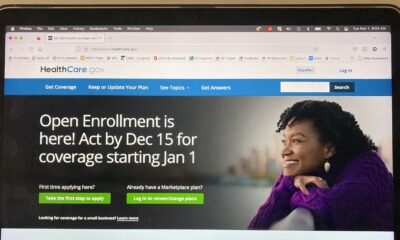Tips & Advices
Aetna Mistakenly Revealed Luigi Mangione Medical Records: Defense

Lawyers for the accused United Healthcare CEO killer, Luigi Mangione, are up in arms over what they say were “secret” communications between his New York prosecutors and Aetna, his former health insurer.
They say prosecutors sent Aetna an “unlawful,” back-channel subpoena seeking his confidential insurance account number and the time period for his coverage — and that in response, Aetna mistakenly sent prosecutors Mangione’s entire, 120-page insurance record.
This “trove of protected medical information” includes “different diagnoses as well as specific medical complaints made by Mr. Mangione,” his lawyers complained in a court filing Thursday night.
New York prosecutors should never have had access to these private records, his lawyers contend. And they should never have looked at them once receiving them, they also argue.
Aetna emailed the records to the Manhattan District Attorney’s Office on June 12, in four files, with a cover letter advising “confidential.” Each file was separately labeled “in large-type bold letters ‘Request for Protected Health Information,” the lawyers wrote.
“It would be impossible for anyone to view a single page of these records and not immediately see that they were private, confidential medical records within the scope of HIPAA,” the federal Health Insurance Portability and Accountability Act, the lawyers wrote.
The sheer volume of Aetna’s response should have alerted prosecutors that “the unlawful subpoena they served on Aetna resulted in far more material than they requested,” the lawyers wrote.
But instead of immediately sending the materials to the judge and the defense — where they should have been directly sent, as required by law — the DA’s office says it downloaded them into an internal “discovery file,” the lawyers wrote.
The lawyers say prosecutors “sat on this information” for 12 days, until June 24, when they sent the judge and defense team an email forwarding the four files. Prosecutors have told Mangione’s lawyers that in the interim, they had reviewed the records, but not “in their entirety,” according to the defense filing.
The defense filing, signed by defense lawyers Karen Friedman Agnifilo, Marc Agnifilo, and Jacob Kaplan, asks New York Supreme Court Justice Gregory Carro to order prosecutors to turn over all of their communications with Aetna.
It also asks the judge to hold “a full evidentiary hearing,” with sworn testimony, to determine possible remedies, including the recusal of lead prosecutor Joel Seidemann, the suppression of evidence, and the dismissal of Mangione’s indictment.
The subpoena, issued directly to Aetna and signed by Seidemann, bypassed the judge and defense team and should never have requested even the limited, HIPAA-protected information of Mangione’s account number and period of coverage, his lawyers argue.
“If they’re seeking information that is privileged, like medical records, the DA can’t just subpoena that stuff directly,” veteran homicide public defender Sam Roberts told Business Insider on Friday.
Prosecutors must first file a motion or application to the judge and defense team, alerting them to the subpoena, and then wait for the judge to review the subpoenaed materials privately, said Roberts, a senior staff attorney on the homicide defense task force of the Legal Aid Society.
“It sounds like they jumped the gun here,” Roberts said. “They got this information without first giving notice to the defense, and they got the information directly from Aetna when they should have sent it to the court first without opening it.”
Mangione’s lawyers allege in their filing that the May 14 subpoena initially commanded Aetna to send someone to appear in court on May 23 with “the account number and period of time during which the following individual received coverage: Luigi Mangione.”
The subpoena was not made public or viewed by BI.
May 23 was “a completely made-up date,” on which no court proceeding was scheduled, Mangione’s lawyers wrote.
Along with the subpoena, Seidemann sent a cover letter with his phone number and email, advising that “in lieu of appearing personally with the requested documents,” Aetna could mail or deliver the records to the court, the lawyers wrote.
Prosecutors “were plainly lying to get the materials as soon as possible,” they wrote, in order to bring their case to trial first, before he could be tried by federal prosecutors.
In addition to the state-level case, which alleges murder as an act of terrorism, Mangione is facing related, death-penalty-eligible murder charges in federal court. Prosecutors in central Pennsylvania say they, too, will try him for forgery and firearm charges related to his arrest there on December 9, after a five-day national manhunt.
Mangione’s lawyers previously complained that in April, Manhattan prosecutors improperly listened to an 11-minute attorney-client phone call, something the DA’s office has denied.
Both state and federal jurisdictions are vying to be first to put Mangione on trial.
Had Mangione’s lawyers not been bypassed, they would have objected to the Aetna subpoena, including on the grounds that “the information sought is not relevant,” they wrote.
A spokesperson for the DA’s office told BI on Friday that they will respond to the defense allegations in court papers.
“Aetna received a subpoena for certain medical records, and we provided them appropriately,” said Phil Blando, executive director for communications for Aetna’s parent company, CVS Health.
Asked if the district attorney subpoena requested details beyond Mangione’s account number and coverage period, Blando told BI in an email, “You have our statement.”
Mangione, a 27-year-old software developer, remains in a federal jail in Brooklyn in the December 4 murder of Thompson.
The 50-year-old father of two from Minnesota was shot in the back at close range outside a Midtown hotel where he was about to address the UnitedHealthcare shareholders meeting.
Mangione is linked to the killing by his so-called “manifesto” and by DNA, ballistics, video, and fingerprint evidence, according to state and federal prosecutors.
He is next due in state court on September 16, and in federal court on December 5; both courts are in Manhattan.
Tips & Advices
Travel alert: Landmines, theft, violence concerns at these 2 Southeast Asian countries
Federal authorities are warning Americans that traveling to two Southeast Asian countries can be dangerous and they should be extra cautious if visiting. They also advise against traveling to the countries’ border altogether.
The U.S. Department of State advisory level for Thailand and Cambodia were increased Friday to a Level 2, “exercise increased caution.”
The travel advisories were raised due to unrest in Thailand and concerns for crime and landmines in Cambodia, according to the advisories.
The U.S. government also issued a Level 4 “do not travel” advisory, advising against traveling within about 30 miles of the Thai and Cambodian border due to fighting between the countries’ military forces that started in May.
“There are reports of fighting, including rocket and artillery fire, between Cambodian and Thai forces along the border. Armed conflict has led to reports of civilian casualties,” the advisors read. “There is a collateral risk of violence, and U.S. citizens are advised to avoid all but essential travel to within 50km of these border areas until further notice. The U.S. government has limited ability to provide emergency services to U.S. citizens in these provinces due to the ongoing risk of armed conflict.”
The caution regarding travel to Thailand is “due to civil unrest associated with ongoing insurgent activities in the Yala, Pattani, and Narathiwat provinces,” that advisory said.
There is occasional violence between Thai security services and armed insurgents in those three southernmost provinces, the advisory explained, and 17 districts in that region are under a state of emergency due to the violence. Visitors risk getting caught up in the fighting and U.S. officials can’t guarantee they’d be able to help, the advisory warned.
The issue in Cambodia is different. That country’s capital city, Phnom Penh, is dealing with street crime, with many travelers losing their phone and bags to thieves, that advisory said. Sexual assault and murder are also concerns.
Landmines and unexploded ordnances are the concern in the provinces of Battambang, Banteay Meanchey, Pursat, Siem Reap, Pailin, and Kampong Thom, the advisory said, particularly in forested areas and dry rice paddies.
If you decide to travel to Cambodia or Thailand, the U.S. Department of State advises:
- “Do not physically resist any robbery attempt.
- Have evacuation plans that do not rely on U.S. government assistance.
- Enroll in the Smart Traveler Enrollment Program (STEP) to get important updates and alerts from the U.S. embassy or consulate. Enrolling helps the U.S. embassy or consulate contact you or your emergency contact in an emergency.
- Review the Country Security Report for Cambodia and Thailand.
- Prepare a contingency plan for emergency situations. Review the Traveler’s Checklist.
- Visit the CDC page for the latest Travel Health Information related to your travel.
- The government highly recommends you buy insurance before you travel. Check with your travel insurance provider about evacuation assistance, medical insurance, and trip cancellation coverage.”
If you purchase a product or register for an account through a link on our site, we may receive compensation. By using this site, you consent to our User Agreement and agree that your clicks, interactions, and personal information may be collected, recorded, and/or stored by us and social media and other third-party partners in accordance with our Privacy Policy.
Tips & Advices
Allianz Life says ‘majority’ of customers’ personal data stolen in cyberattack

U.S. insurance giant Allianz Life has confirmed to TechCrunch that hackers stole the personal information of the “majority” of its customers, financial professionals, and employees during a mid-July data breach.
When reached by TechCrunch, Allianz Life spokesperson Brett Weinberg confirmed the breach.
“On July 16, 2025, a malicious threat actor gained access to a third-party, cloud-based CRM system used by Allianz Life,” referring to a customer relationship management (CRM) database containing information on its customers. “The threat actor was able to obtain personally identifiable data related to the majority of Allianz Life’s customers, financial professionals, and select Allianz Life employees, using a social engineering technique,” the spokesperson said.
The company disclosed the data breach on Saturday in a legally required filing with Maine’s attorney general, but did not immediately provide a number of how many Allianz Life customers are affected. According to the spokesperson, Allianz Life has 1.4 million customers. Its parent company, Allianz, has more than 125 million customers worldwide.
Allianz Life said it notified the FBI, and added it had “no evidence” that any other systems on its network were compromised.
The insurance giant would not say if it had received any communication from the hackers, such as a ransom note. The company also would not attribute the breach to a hacking group.
Allianz Life is the latest company in the past month to have been hacked during a wave of data breaches targeting the wider insurance industry, including Aflac, a major provider of supplementary health insurance. Security researchers at Google said in June that they were “aware of multiple intrusions” across the insurance sector attributed to Scattered Spider, a collective of hackers and techniques that rely on social engineering techniques, such as deceptively calling and tricking helpdesks into granting them access to a company’s network.
Prior to targeting insurance companies, the Scattered Spider hackers were seen targeting the U.K. retail industry, as well as the aviation and transportation sectors, and are historically known for hacks targeting Silicon Valley technology giants.
Per the Maine filing, Allianz plans to begin notifying affected individuals around August 1.
Do you know more about the Allianz Life cyberattack? Are you an affected customer or employee? Securely contact this reporter via encrypted message at zackwhittaker.1337 on Signal.
Tips & Advices
Venus Williams and her health insurance: 4 things to know : Shots

Venus Williams returns a shot against Magdalena Frech on day 4 of the Mubadala Citi DC Open. Williams, 45, said she’s been on COBRA health insurance.
Scott Taetsch/Getty Images
hide caption
toggle caption
Scott Taetsch/Getty Images
What drove Venus Williams to the court at the Mubadala Citi DC Open this week after a year-long break from competition?
“I had to come back for the insurance,” she quipped in an on-court interview after winning her first-round match on Tuesday. “I was like, ‘I got to get my benefits on!’ Started training.”
The crowd at the stadium in D.C. laughed knowingly. “You guys know what it’s like!” she said.
Venus Williams made the remarks about health insurance after winning her first round match on Tuesday.
YouTube
Even if you’re not a seven-time grand slam champion who just became the oldest player to win a pro women’s singles match in decades, you probably know the job-health insurance juggle that Williams was talking about.
Here are four ways U.S. health insurance can be challenging for Williams and many other Americans.
1. Her job is a little off and on.
In the U.S., most working-age people get their health insurance through work. Their employer gives them a few plan options and then pays a healthy chunk of the premium cost, with the rest deducted from employees’ paychecks.
When someone leaves a regular job maybe to start a business or take a break, there goes that health insurance deal. That’s essentially what happened to Williams — she took a break from competition and lost access to her regular benefits.
The health insurance Venus Williams got through the Women’s Tennis Association was a “best-in-class global medical, dental and vision insurance plan,” WTA wrote in a statement to NPR. In order to be eligible, players have to have a certain ranking and play a certain number of events in the previous year, according to the statement, and coverage lasts for the full calendar year.
“They informed me earlier this year I’m on COBRA,” Williams explained on the court Tuesday. COBRA is a law that allows you to keep your job-based insurance plan after your job ends, but you have to pay for the whole premium yourself.
“With COBRA, you may have a very good plan, but your health care costs are going to go up,” explains Miranda Yaver, health policy professor at the University of Pittsburgh. It’s notoriously expensive, often $500 per month or more. COBRA to cover a whole family’s insurance premium can easily rival a mortgage payment.
Venus Williams is a multi-millionaire, so the premium cost might not matter to her in the same way it does to the average person, especially if it allows her to keep that “best-in-class” plan she’s used to.
2. She has health care needs.
“Let me tell you, I’m always at the doctor, so I need this insurance,” Williams said in her courtside interview.
Williams recently explained she had surgery for uterine fibroids that had gone undertreated for years, she said. She also was diagnosed with an auto-immune condition called Sjogren’s syndrome in 2011.
She’s also an elite athlete. “Someone in her position might need physical therapy, sports, medicine, specialized care, and to be able to get that anywhere in the world,” says Cynthia Cox, a vice president at the health research organization KFF.
Plus, Williams is now 45 years old. Health insurance costs generally increase with age, as do health problems.
All of that could make finding a health plan that works for her more complicated than for most people.
3. She has way more options than she used to.
Before the Affordable Care Act, Venus Williams would have really been in a tough spot.
Professional athletes were included on a list of “Ineligible Occupations” — jobs that health insurance companies deemed too risky to provide coverage for — along with loggers, miners and taxi cab drivers.
Also back then, “even a wealthy person might have had preexisting conditions that could have made them uninsurable no matter how much money they were willing to pay for their premium,” Cox says.
That contributed to “job lock” — where people were stuck in their jobs no matter what because they needed the health insurance.
Now, if Williams really didn’t want to compete anymore and ran out of her 18-months of COBRA coverage, she could go to Healthcare.gov and buy an Affordable Care Act plan.
4. Only in the U.S., jobs and health insurance are deeply linked.
There’s no escaping the fact that in America, health insurance is connected to employment. “The dominant insurance model in the United States is employer-sponsored insurance,” Yaver says. (The story of how that came to be is related to the post-World War II economy when health insurance was a “fringe benefit,” to attract employees in a tight labor market.) Yaver adds that for workers who get insurance from their jobs, it’s often “a good deal.”
Since Congress passed the One Big Beautiful Bill Act, the public insurance plan for low-income people, Medicaid, will soon be tied to work, too. Beneficiaries will have to periodically prove they’re working a certain number of hours per month to be able to keep their health benefits. That requirement will affect mostly middle-aged, low-income women, according to a recent analysis.
For Venus Williams, the off-and-on nature of her job that comes with a high risk of injuries makes employer-based health insurance especially hard. In a way, the tennis hall-of-famer is dealing with a very special version of “job lock.”
Her fans can celebrate, though. Even if it’s for the health insurance, they get to see her on the court again; she’s playing a tournament next month in Cincinnati.
-

 Brand Stories6 days ago
Brand Stories6 days agoBloom Hotels: A Modern Vision of Hospitality Redefining Travel
-

 Brand Stories1 day ago
Brand Stories1 day agoCheQin.ai sets a new standard for hotel booking with its AI capabilities: empowering travellers to bargain, choose the best, and book with clarity.
-

 Destinations & Things To Do7 days ago
Destinations & Things To Do7 days agoUntouched Destinations: Stunning Hidden Gems You Must Visit
-

 AI in Travel7 days ago
AI in Travel7 days agoAI Travel Revolution: Must-Have Guide to the Best Experience
-

 Brand Stories3 weeks ago
Brand Stories3 weeks agoVoice AI Startup ElevenLabs Plans to Add Hubs Around the World
-

 Brand Stories2 weeks ago
Brand Stories2 weeks agoHow Elon Musk’s rogue Grok chatbot became a cautionary AI tale
-

 Destinations & Things To Do24 hours ago
Destinations & Things To Do24 hours agoThis Hidden Beach in India Glows at Night-But Only in One Secret Season
-

 Asia Travel Pulse3 weeks ago
Asia Travel Pulse3 weeks agoLooking For Adventure In Asia? Here Are 7 Epic Destinations You Need To Experience At Least Once – Zee News
-

 AI in Travel3 weeks ago
AI in Travel3 weeks ago‘Will AI take my job?’ A trip to a Beijing fortune-telling bar to see what lies ahead | China
-

 Brand Stories3 weeks ago
Brand Stories3 weeks agoChatGPT — the last of the great romantics







You must be logged in to post a comment Login